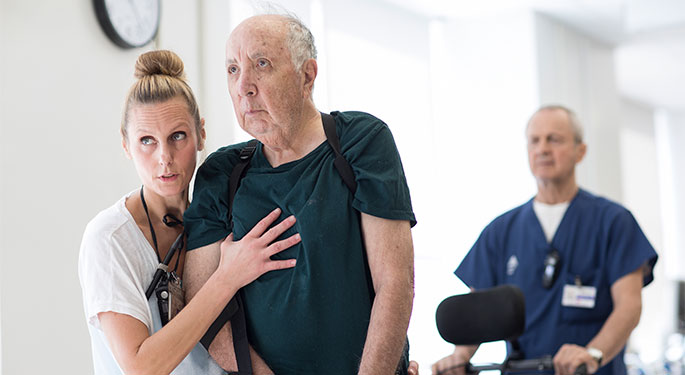Stroke Rehabilitation

If you have suffered a stroke, our team of specialists at Mount Sinai offer a personalized rehabilitation program that incorporates a combination of cognitive, physical, occupational, neuropsychological, and speech therapy to maximize your functional independence.
Stroke therapy at Mount Sinai is designed to help our patients regain movement, improve swallowing and speech challenges, relearn daily tasks, build confidence, self-esteem, and develop coping strategies for adjusting to disability.
Inpatient Services
At Mount Sinai, we offer comprehensive inpatient rehabilitation to aid recovery and help transition patients from the hospital environment to home. The treatment team includes physicians, nurses, physical and occupational therapists, speech language pathologists, neuropsychologists, social workers, and therapeutic recreation specialists.
During inpatient rehabilitation, patients receive three hours of therapy a day, five days a week to address any functional, cognitive, and behavioral needs. Our team of stroke experts offers evidence-based treatments, education, and emotional support for patients and their families.
Outpatient Services
Following discharge from inpatient rehabilitation, most stroke survivors need outpatient therapy to continue regaining and refining specific skills. At Mount Sinai, we offer a variety of outpatient rehabilitation services including physical therapy, occupational therapy, speech therapy, social work, and neuropsychology, Patients may be seen in our department after completing inpatient rehabilitation at Mount Sinai or after being referred to us by another doctor or medical practice as a new patient.
Our comprehensive outpatient program is CARF-accredited, and is run by skilled professionals who have specialized in stroke rehabilitation for many years.
We also utilize innovative, world class technology to strengthen your motor skills after experiencing a stroke. This technology includes but is not limited to:
- Bioness: These state-of-the-art systems gently stimulate muscles paralyzed by Traumatic Brain Injury in your upper and lower extremities, enabling many patients to regain essential function
- Functional Electrical Stimulation (FES): A form of therapy that uses low energy electrical pulses to artificially generate body movements in individuals who have been paralyzed due to injury to the central nervous system
- NeuroMove: This device teaches healthy parts of the brain after a stroke to take over lost functionality through neuroplasticity
- Wii: Video game system that is used to improve hand eye coordination and balance
Stroke Support Group
At Mount Sinai, our stroke support group, STARS (Surviving & Thriving After Rehabilitation of Stroke), offers patients the opportunity to meet fellow stroke survivors and help you adjust to the new challenges you may face. The group includes a variety of topics based on interest and includes discussion on coping strategies, physical challenges, cognitive and emotional changes, and family dynamics. In addition to these discussions, we also engage in recreational therapy sessions and group outings for community re-integration and socialization.